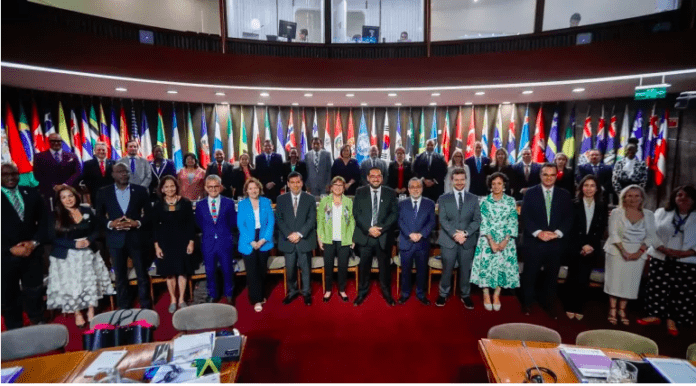
Education ministers from Latin America and the Caribbean (LAC) were ending a two-day meeting here on Friday amid concerns that the challenge for the region is for “girls, boys, and adolescents to return to school, to reengage with it, to see their classrooms as a transformative space.”
The conference, which has been convened by UNESCO and the Ministry of Education of Chile, is intended to advance defining public policies focused on the reactivation, recovery, and transformation of education as accelerators of the educational goals of the 2030 Agenda.
The meeting is co-organised by the CAF Bank, the World Bank, the Economic Commission for Latin America and the Caribbean (ECLAC), and the United Nations Children Fund (UNICEF).
The organisers described the conference as one of the most significant dialogue efforts in this field, as it brings together representatives from over 30 ministries of education, representing around 125 million students and 6.9 million teachers.
Chile’s education Nicolás Cataldo said that the coronavirus (COVID-19) pandemic “took a lot from us, some of us even lost loved ones, and in education, it shook a link, that cultural thread that binds families and each of their members to an educational institution.
“Our challenge is to recover, of course, but also to reactivate…because what we had before was insufficient. Today, we have the opportunity for this sense of urgency to allow us to leap forward and achieve better attendance and retention rates, learning, and a better educational experience,” he added.
The organisers said that to move forward with this challenge, the “Education Ministerial, Santiago 2024,” conference must create a regional reference framework on public policies for reactivation, recovery, and educational transformation “that serves as a mechanism to effectively move from commitment to action.”
To contribute to this debate, ECLAC, with the support of the World Bank and UNESCO, developed the document “Challenge of the Financial Sustainability of Education in Latin America and the Caribbean.”
The document argues that countries are at a crucial moment to invest more in education, ensuring the financial sustainability of their policies. For this, ministries must actively participate in the budgetary decisions concerning their educational systems.
The director of the UNESCO Regional Multi-sectoral Office, Claudia Uribe, says there are signs of recovery in some educational indicators of the continent but that “we still face considerable challenges, with 9.6 million children out of school in 2022.
“In the field of educational policies, we have witnessed remarkable progress but also identified areas that require more attention. Compensatory actions to address socio-educational gaps and early warnings based on disaggregated data are emerging as promising strategies,” Uribe added.
She proposes that a “post-pandemic learning recovery is a crucial and urgent aspect, but few countries have developed comprehensive approaches with coordinated and systemic action plans.
“This poses governance and resource allocation challenges, which are central for the coming years in the context of discontinuity and budgetary limitations. This topic has been extensively addressed in our latest report, “The Urgency of Educational Recovery in Latin America and the Caribbean.”
ECLAC executive secretary José Manuel Salazar-Xirinachs said that “education is central to addressing the triple trap of development in which Latin America and the Caribbean find themselves, characterised by high inequality, dynamic insufficiency or inability to grow at higher and sustained rates, and low institutional capacities.
“Every successful strategy for sustainable development, as well as growth and employment, requires a decisive investment in education,” he added.













